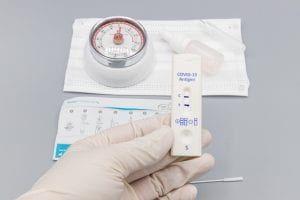Have you ever wondered why you display less or more severe symptoms when you catch COVID compared to your friends even though it was the same variant? When I was infected with COVID, I couldn’t help but wonder why I had a more severe fever than some of my friends although we caught it around the same time, and I never understood why. In the medical community, this has always been a mystery as well until a study that was published in July that unveiled a possible explanation – genetic variants that are present in some people but not others.
In the study, after analyzing the genetic data of 30,000 who carried the COVID virus, the researchers found that those the people with a specific gene variant – HLA-B15:01- were more than twice as likely to remain asymptomatic, and individuals with two copies of the variant showed a eightfold greater likelihood of being asymptomatic. This reveals that this could be the key gene that influences whether an individual is likely to display certain symptoms after catching COVID. Those participants who were found to not have this particular gene then displayed the common COVID symptoms such as fever, shortness of breath, and cough.
This study underscores the significance of variations in the human leukocyte antigen (HLA) complex, a set of genes that is crucial for the immune system’s ability to detect disease causing organisms. Further study conducted by the researchers revealed that this gene variant’s protective effect is due to its ability to tap into the body’s immune system against common viruses like the flu or cold. By analyzing T cells (white blood cells that play crucial roles in the body’s immune system) collected before the pandemic from individuals carrying the HLA-B15:01 variant, researchers discovered that these cells exhibited reactivity not only to a protein fragment from SARS-CoV-2 but also to similar fragments from seasonal viruses. This suggests that individuals with the HLA-B15:01 variant may have immune cells primed for the virus from exposure to seasonal viruses, contributing to their asymptomatic reaction to COVID.
In our AP Biology class, we learned about the specific mechanisms and functions of T cells, which is important in this case to understand why the genetic variation is able to prevent certain symptoms from occurring. T cells are type of white blood cells in the body’s immune system that recognize antigens presented by dendritic cells (Helper T Cells), stimulate other immune cells such as B cells to produce antibodies, as well as attack cells infected with the virus (cytotoxic T cells). In this case, those individuals who have the HLA-B15:01 variant would already have primed T cells from seasonal viruses that prepare their bodies against the actual COVID virus, leading to the lack of symptoms displayed.
Looking ahead, this study suggests that these findings and observations could help inform and design the next generation of vaccines, offering potential solutions to prevent symptoms in those infected with viruses. After reading this article, how do you think this finding regarding the impact of genetic variation on COVID symptoms will influence the future of vaccines?



Leave a Reply